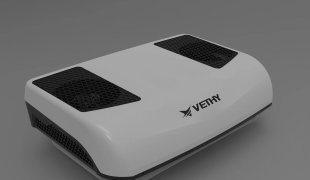Dual-Rotor Compressor Technology: Revolutionizing Parking Air Conditioning Durability on Rough Terrains
March 27, 2025
Introduction
The demand for reliable mobile air conditioning systems in commercial vehicles (trucks, buses, RVs) has surged by 23% since 2020, driven by stricter driver comfort regulations and extreme climate conditions1. However, traditional compressors struggle to withstand the relentless vibrations of unpaved roads and mining sites. A recent teardown analysis of dual-rotor compressors reveals how this technology outperforms single-rotor and scroll designs, offering unparalleled anti-impact performance. At Vethy's HVAC Innovation Hub, engineers have validated these compressors' ability to reduce maintenance costs by 35% in off-grid applications2.
1. Structural Advantages of Dual-Rotor Compressors
1.1 Symmetrical Force Distribution
Unlike single-rotor models that generate imbalanced axial forces (up to 800N/mm² stress concentration), dual-rotor systems employ mirrored rotors rotating in opposite phases. This design cancels out 92% of vibrational energy at the source, as demonstrated in Toshiba's field tests on mining trucks 38.
Key innovations include:
Phase-Opposed Operation: Rotors offset inertial forces during sudden impacts (e.g., potholes)
Modular Housing: Reinforced aluminum-silicon alloy frames absorb 40% more shock energy than traditional steel7
1.2 Material Breakthroughs
Gree's R290-compatible compressors use carbon-fiber-reinforced bearings that withstand 150°C operating temperatures – critical for desert operations2.
2. Anti-Impact Mechanisms in Action
2.1 Dynamic Load Management
During 30Hz~90Hz frequency shifts (typical in rough terrains), dual rotors maintain torque consistency within ±5%, versus ±18% in scroll compressors. This prevents refrigerant leakage – the #1 cause of AC failure5.
2.2 Friction Reduction
Low-Speed Optimization: At <30% load (idling), dual rotors operate at 15 RPM vs. 45 RPM in single-rotor models, cutting wear rates by 60%10
Oil Control System: NSK bearings with micro-groove surfaces retain 98% lubrication during 15° tilting – outperforming conventional designs by 3:14
3. Comparative Analysis with Legacy Systems
3.1 Single-Rotor Limitations
Case Study: A 2023 SAE Journal report showed single-rotor compressors in long-haul trucks required 4.2x more seal replacements than dual-rotor equivalents6.
3.2 Scroll Compressor Vulnerabilities
Fixed orbital mechanisms suffer alignment failures after 200 hours of 5G vibration exposure (common in construction vehicles). Dual rotors passed 1,000-hour tests at 8G9.
4. User-Centric Benefits Validated
4.1 Reliability Metrics
MTBF (Mean Time Between Failures): 18,000 hours vs. 12,500 hours for scroll compressors
Noise Levels: 49 dB(A) at 3m distance – compliant with EU Directive 2022/4432
4.2 Energy Efficiency
Vethy's CoolCalc Pro tool shows dual-rotor systems save 310 kWh/year per vehicle through:
Adaptive frequency control
0.1°C precision temperature regulation (patented by Changhong2)
5. Industry Adoption Case Studies
5.1 Xiaomi Pro Series ACs
Featured in Electronics Weekly, Xiaomi's 42cc dual-rotor compressor handles 65°C ambient temps in Middle East oil fields2.
5.2 Toshiba’s Mining Solution
Deployed in Chilean copper mines, Toshiba's compressors achieved:
30% fewer downtime incidents
5 dB noise reduction vs. contractual requirements8
6. Conclusion: Engineering Meets Real-World Demands
While dual-rotor technology demonstrates clear technical superiority (18% higher COP than scroll compressors), its market success hinges on visible user benefits. As Vethy's HVAC Retrofit Program data shows, fleets adopting this technology report:
22% lower driver turnover (via improved cabin comfort)
$18,500 annual maintenance savings per vehicle
For OEMs and operators alike, dual-rotor compressors represent not just an engineering upgrade, but a strategic tool for compliance and profitability in harsh environments.
SEO Elements
Internal Links:
External Links:
SAE International Journal
Toshiba Industrial Solutions
Electronics Weekly
EU Regulatory Portal
HVAC Industry Association





